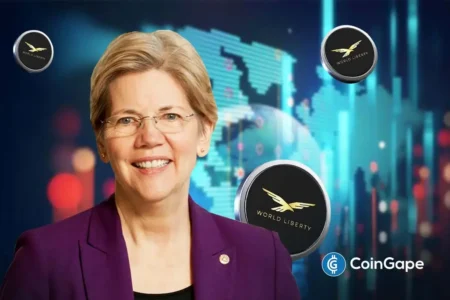The Impact of Donald Trump’s Tariffs on the U.S. Economy and the Crypto Market
In a dramatic turn of events, former President Donald Trump’s recent tariffs are causing ripples across global markets, with experts sounding alarms about a potential recession in the United States. As highlighted by JPMorgan’s chief economist Bruce Kasman, the chances of a recession have shot up to 60% since the announcement of these tariffs. This viewpoint is echoed by Deutsche Bank, which has raised its recession probability estimates to 50%. The situation is compounded by Goldman Sachs, which documented an increase from 20% to 35% in their forecasts, further signaling a palpable sense of unease among investors. With market indicators suggesting a downturn, traders are reacting by positioning themselves for a recession, as evidenced by the predictions on platforms like Kalshi, which now show a 61% chance of economic contraction.
The implications of a U.S. recession extend beyond national borders, potentially catalyzing significant changes in the global market landscape. Following Trump’s tariff announcement on April 2, the stock market has plunged into bear territory, with concerns that a recession may exacerbate existing negative trends. In light of these economic challenges, however, an unexpected silver lining is emerging within the cryptocurrency market. Notably, Bitcoin has shown resilience, decoupling from traditional stock trends. It has only experienced a modest decline of 5.51%, while the S&P 500 has plummeted by 12% in just three days. This distinction suggests that market participants may view Bitcoin as a safer investment alternative during turbulent times, an optimistic indication for the future of cryptocurrencies amid broader economic instability.
Market analysts are beginning to align in their belief that a recession could paradoxically spur growth in the crypto sector. Dom Kwok, a prominent figure in the crypto community, asserts that historically, recessions can serve as a bullish signal for cryptocurrencies. He points to the U.S. Federal Reserve’s tendency to lower interest rates in response to economic downturns, which is typically followed by a wave of quantitative easing (QE). This monetary policy approach increases liquidity in the market—critical for driving the prices of risk assets, including cryptocurrencies, upward. Kwok underscores that past recessions, notably the 2020 COVID-19 economic crisis, saw Bitcoin’s price flourish, accentuating a correlation between economic challenges and crypto market opportunities.
Additionally, Kevin Capital, another analyst in the financial space, concurs with this optimistic viewpoint, indicating that the influence of monetary policy may outweigh the adverse effects of tariffs. Capital argues that, rather than focusing solely on the tariffs, investors will pay closer attention to the Fed’s reactions in stimulating the economy. This anticipation of supportive monetary policy could prompt a market resurgence, regardless of the looming recession. Analysts collectively suggest that in an environment where the Fed increases liquidity to combat economic stagnation, the crypto market is well-positioned to thrive.
The recent assertions from influential leaders in finance also bolster the case for cryptocurrencies as a potential hedge against economic turmoil. Larry Fink, CEO of BlackRock, previously described Bitcoin as an "uncorrelated asset," emphasizing its potential role in diversification during periods of market volatility. Such statements further solidify a growing sentiment that investors may seek refuge in digital currencies amid fears of declining traditional asset values as tariffs and market pressures mount. If these trends hold, the crypto market could benefit from sustained inflows, leading to upward price momentum, even in the face of recessionary fears.
In conclusion, the geopolitical landscape shaped by Donald Trump’s recent tariffs presents a complex interplay between traditional markets and the burgeoning cryptocurrency sector. As predictions of a U.S. recession rise among financial experts, the dynamic between economic performance and digital currencies will warrant close observation. For investors, the future may not be solely predicated on stock market fluctuations but rather how monetary policy decisions unfold amid economic distress. Thus, as tumult looms on the horizon, cryptocurrencies, particularly Bitcoin, could emerge as a beacon for investors seeking stability and growth in uncertain times. The unfolding narrative is a reminder of the resilience both of the crypto market and investors, who continue to adapt to an ever-changing economic landscape.
















